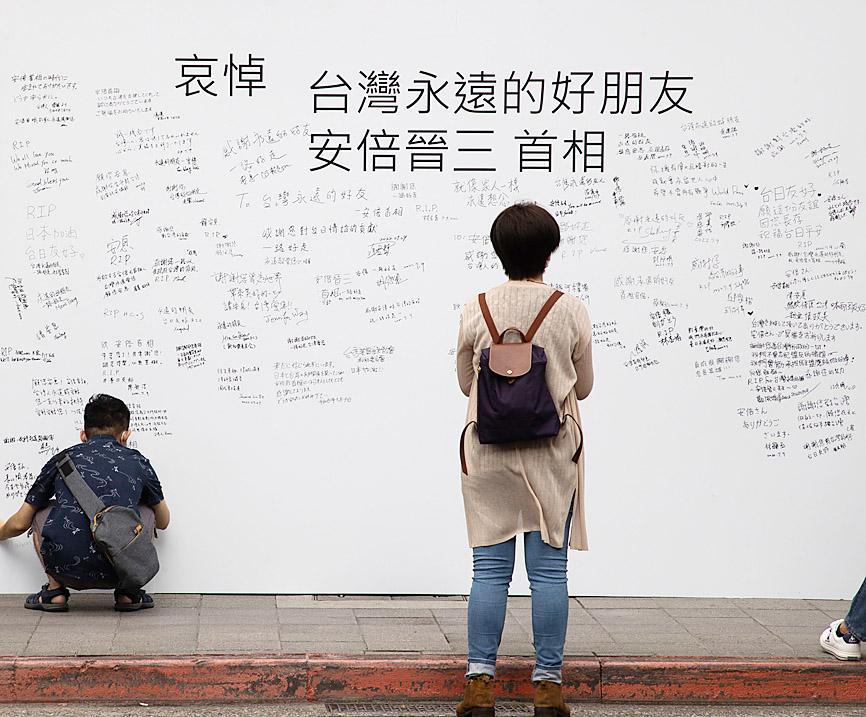President Tsai Ing-wen (蔡英文) yesterday ordered public institutions to fly the nation’s flag at half-mast tomorrow to honor former Japanese prime minister Shinzo Abe, who was killed on Friday after being shot during a campaign event in western Japan.
All Taiwanese flags at government buildings and public schools across Taiwan will be flown at half-mast for one day to honor Abe’s decades-long contributions to promoting bilateral ties between Taiwan and Japan, Presidential Office spokesman Xavier Chang (張惇涵) said in a statement.
The move is also intended to show that Taiwan stands with Japan in firmly defending freedom and democracy, Chang said, adding that Abe was a staunch supporter of Taiwan.

Photo: CNA
He said that Abe helped facilitate Japan’s donation of 1.24 million doses of the AstraZeneca COVID-19 vaccine to Taiwan last year amid a shortage, and lauded the quality of Taiwanese pineapples on social media after China blocked imports of the fruit in August last year.
Abe was also the forerunner in promoting a free and open Indo-Pacific region, and had repeatedly underscored the importance of peace and stability in the Taiwan Strait, Chang added.
Abe died on Friday evening, at the age of 67, hours after being shot twice during an election campaign in Nara, Japan. A 41-year-old suspect was arrested at the scene.
Taiwanese politicians across the political spectrum have expressed their condolences, with the Chinese Nationalist Party (KMT) denouncing the assassination as “violating the basic principles of a democratic and rule-based society.”
Legislative Speaker You Si-kun (游錫堃) said that Tsai would decide whether Taiwan is to send a parliamentary delegation to Japan to pay tribute to Abe, whose funeral has been set for Tuesday.
You said that Abe had agreed to visit the nation and planned to give a speech at the Legislative Yuan, but “sadly, that won’t be happening anymore.”
“Abe will be forever missed by Taiwanese,” You added.
Democratic Progressive Party Legislator Tsai Yi-yu (蔡易餘) said that the National Palace Museum could be used to hold a special exhibition in memory of Abe at its southern branch in Chiayi County.
The branch had previously hosted exhibitions featuring Japanese culture, including works of art from the Tokyo National Museum, Kyushu National Museum and Kobe City Museum, making it a good fit to hold such a special event to enable Taiwanese to learn more about Abe’s life and his relations with Taiwan, he added.
Additional reporting by Wang Chien-hao and Lin Yi-chang

MAKING WAVES: China’s maritime militia could become a nontraditional threat in war, clogging up shipping lanes to prevent US or Japanese intervention, a report said About 1,900 Chinese ships flying flags of convenience and fishing vessels that participated in China’s military exercises around Taiwan last month and in January have been listed for monitoring, Coast Guard Administration (CGA) Deputy Director-General Hsieh Ching-chin (謝慶欽) said yesterday. Following amendments to the Commercial Port Act (商港法) and the Law of Ships (船舶法) last month, the CGA can designate possible berthing areas or deny ports of call for vessels suspected of loitering around areas where undersea cables can be accessed, Oceans Affairs Council Minister Kuan Bi-ling (管碧玲) said. The list of suspected ships, originally 300, had risen to about 1,900 as

Japan’s strategic alliance with the US would collapse if Tokyo were to turn away from a conflict in Taiwan, Japanese Prime Minister Sanae Takaichi said yesterday, but distanced herself from previous comments that suggested a possible military response in such an event. Takaichi expressed her latest views on a nationally broadcast TV program late on Monday, where an opposition party leader criticized her for igniting tensions with China with the earlier remarks. Ties between Japan and China have sunk to the worst level in years after Takaichi said in November that a hypothetical Chinese attack on Taiwan could bring about a Japanese

MORE RESPONSIBILITY: Draftees would be expected to fight alongside professional soldiers, likely requiring the transformation of some training brigades into combat units The armed forces are to start incorporating new conscripts into combined arms brigades this year to enhance combat readiness, the Executive Yuan’s latest policy report said. The new policy would affect Taiwanese men entering the military for their compulsory service, which was extended to one year under reforms by then-president Tsai Ing-wen (蔡英文) in 2022. The conscripts would be trained to operate machine guns, uncrewed aerial vehicles, anti-tank guided missile launchers and Stinger air defense systems, the report said, adding that the basic training would be lengthened to eight weeks. After basic training, conscripts would be sorted into infantry battalions that would take

DEEP-STRIKE CAPABILITY: The scenario simulated a PLA drill that turned into an assault on Taiwan’s critical infrastructure, with the launchers providing fire support Taiwan yesterday conducted this year’s first military exercises at Longsiang Base in Taichung, demonstrating the newly acquired High Mobility Artillery Rocket System’s (HIMARS) ability to provide fire support and deep-strike capabilities. The scenario simulated an attack on Penghu County, with HIMARS trucks immediately rolling into designated launch areas and firing barrages at the Wangan (望安) and Cimei (七美) islands, simulating the provision of fire support against invading forces. The HIMARS are supposed to “fire and leave,” which would significantly increase personnel and equipment survivability, a military official said. The drill simulated an exercise launched by the Chinese People’s Liberation Army (PLA) Eastern